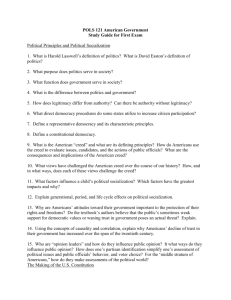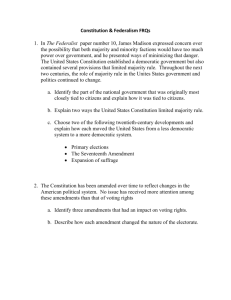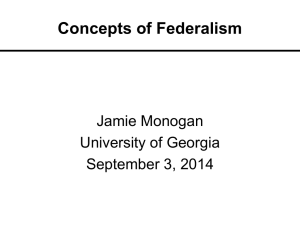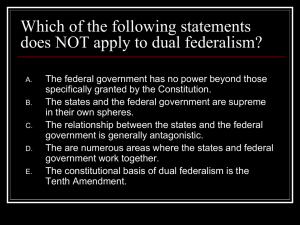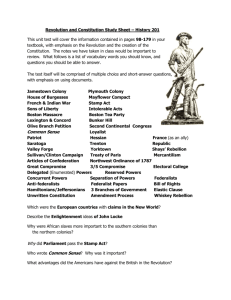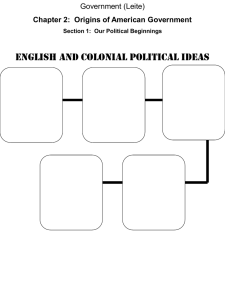POLS 121 American Government Study Guide for First Exam
advertisement
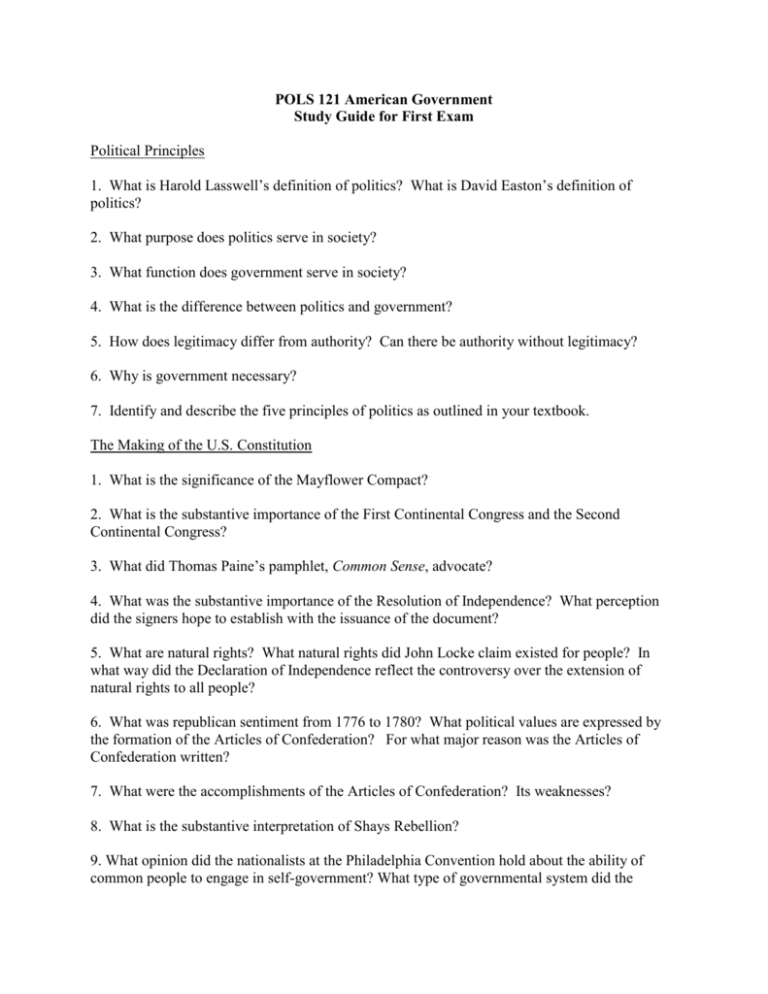
POLS 121 American Government Study Guide for First Exam Political Principles 1. What is Harold Lasswell’s definition of politics? What is David Easton’s definition of politics? 2. What purpose does politics serve in society? 3. What function does government serve in society? 4. What is the difference between politics and government? 5. How does legitimacy differ from authority? Can there be authority without legitimacy? 6. Why is government necessary? 7. Identify and describe the five principles of politics as outlined in your textbook. The Making of the U.S. Constitution 1. What is the significance of the Mayflower Compact? 2. What is the substantive importance of the First Continental Congress and the Second Continental Congress? 3. What did Thomas Paine’s pamphlet, Common Sense, advocate? 4. What was the substantive importance of the Resolution of Independence? What perception did the signers hope to establish with the issuance of the document? 5. What are natural rights? What natural rights did John Locke claim existed for people? In what way did the Declaration of Independence reflect the controversy over the extension of natural rights to all people? 6. What was republican sentiment from 1776 to 1780? What political values are expressed by the formation of the Articles of Confederation? For what major reason was the Articles of Confederation written? 7. What were the accomplishments of the Articles of Confederation? Its weaknesses? 8. What is the substantive interpretation of Shays Rebellion? 9. What opinion did the nationalists at the Philadelphia Convention hold about the ability of common people to engage in self-government? What type of governmental system did the nationalists conclude was needed? 10. What are the central elements Great Compromise? 11. What was the Three-Fifths Compromise? 12. What was the Connecticut Compromise? 13. What are the central elements of the Madisonian Model? 14. What fundamental principles did the Constitution seek to establish? 15. What did the Federalists and Anti-Federalist believe and what type of government did each faction want? 16. What was a necessary compromise to ensure the ratification of the Constitution? 17. Essentially, what was the inclusion of the Bill of Rights meant to accomplish? Why was it important to the ratification of the Constitution? 18. Why was compromise necessary for the ratification of the Constitution? 19. What are the two methods of proposing an amendment to the Constitution? What are the two methods for ratification of proposed amendments? Why was the amendment process made so difficult? 20. What informal methods of constitutional change have been used over the years? Expand on the way in which each of these methods have been used. 21. What is the substantive importance of Marbury v. Madison? Federalism 1. What are the political reasons for why a federal system in appealing? What are the benefits of a federal system? What are the drawbacks of a federal system? 2. How does federalism reflect a compromise between those who favored a strong central government and those who favored strong state governments? 3. What is the constitutional basis for American federalism? Are there specific references in the Constitution that speak of a “federal system”? 4. What are the powers of the national government? What are the powers of state governments? What are the concurrent powers of the national and state governments? Are there any powers denied the national and state governments? What are these? 5. What is the difference between implied and expressed powers? 6. What inherent powers does the national government possess? 7. What is the purpose of the Elastic Clause? 8. What does the Tenth Amendment to the Constitution say about states’ powers? Has this amendment been consistently interpreted by the Supreme Court over the years? What forces have influenced how the courts interpret the Tenth Amendment? 9. What is the Supremacy Clause? Has this clause produced conflict between the states and national government over the years? In what ways? How does this conflict relate to the ratification of the Constitution debate? 10. What is horizontal federalism? 11. What is the substantive importance of McCulloch v. Maryland (1819)? 12. What is the Commerce Clause? 13. What is the substantive importance of Gibbons v. Ogden (1824)? 14. What was at the heart of the controversy that led to the Civil War? 15. What is dual federalism? 16. What is cooperative federalism? 17. Describe the changes in the 20th century occurring in the shifting conceptions of federal/state relations. Specify specific programs and policy changes in each period. 18. How has the Marshall interpretation of the Commerce Clause affected federalism in the 20th century? 19. What is the goal of new federalism? 20. Describe the various types of grants used by the federal government over the years. 21. What is the substantive importance of National League of Cities v. Usery (1976)? 22. What is the substantive importance of Garcia v. San Antonio Metropolitan Transit Authority (1985)? 23. What is the substantive importance of South Dakota v. Dole (1987)? 24. What is the substantive importance of United States v. Lopez (1995)?
